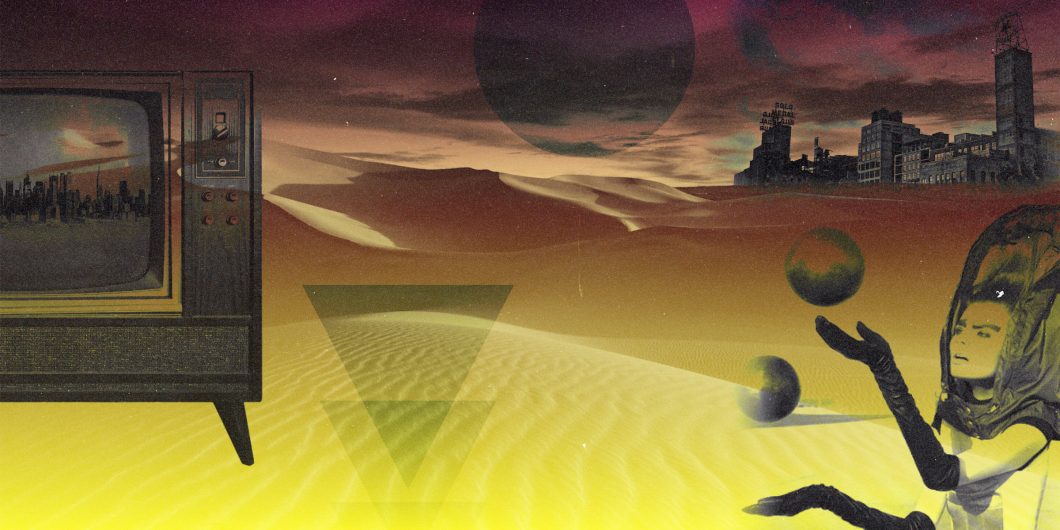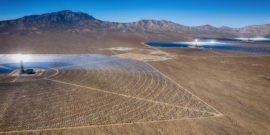Tenet presents the ultimate lesson of tragedy: Desire defeated returns as revenge.
The Past and Future of Humanity
We are at the end of the television era, as social media and encrypted messaging replace broadcasting from one authority to a somewhat captive audience of up to 100 million Americans. It seems strange, but it makes sense that our storytelling should suddenly turn nostalgic, rehearsing stories from the dawn of television: Asimov’s Foundation (the 40s) is now prestige TV on Apple, a corporation straight out of Asimov tales of robotics; Frank Herbert’s Dune (the 60s) has also been filmed again. Others will follow, undoubtedly.
We may call filming these stories progress—finally, it can be done, technologically and economically. These might be the two most applauded stories in science fiction. They might summon vast audiences, reminding us of our need for unity. The popularity of these stories offers an example of the hidden influence of a certain despairing futurism intended to solve the drama of American individualism by committing everyone to a definite vision of the future. But is it progress also in the sense that these tales of mankind’s cosmic destiny help us understand our future and ourselves?
One thing’s clear: some of our elites, for example moviemakers and studios, want to create myths that can hold audiences spellbound. This reasserts the power of imagination over our lives at the very moment we all increasingly feel we are experiencing the unimaginable—a future that hadn’t been predicted and cannot quite be understood or controlled. The events that are making us mad, roiling politics, society, and even the economy, are also the refutation of previous theories of Progress, which is predictable and good by definition. Further, this mythmaking attempts to teach our elites, not just the rest of us, how to talk about belief and religion from a poetic point of view, with visual arts and symbols. Yet it does so entirely on the basis of atheism.
Individuality as Will
If God is sitting this one out, people must become desperate or bold. One is reminded of the famous phrase of the founder of Zionism, Theodore Herzl: If you will it, it is no dream. Indeed, Israel is evidence that founding is possible even in our modern times, for all the decadence of our civilization. Frank Herbert also imagined a founding in Dune, though he was a mild, mid-century liberal, curious about marvels scientific and occult, about West and East, and a bit of a hippie, truth to tell. He started out a journalist; it took him a long time to make a living writing, despite Dune’s amazing success. He seemed far less prophetic and far sillier back then, when Americans presumed their way of life was impossible to overthrow. Certainly, it could not be threatened by stories like Dune, which can be summarized thus: Boy starts galactic jihad to save decadent mankind from destruction, wins, eventually becomes emperor-prophet, and fathers a new god. Adults shook their heads at such ideas, but this was before Harry Potter became a multi-billion dollar industry.
Dune, moreover, is about re-founding an empire. Protagonist Paul Atreides starts out a duke’s son only to see feudal rivals invade and destroy his family’s new planet. Naturally, he wants revenge. He recruits as allies savage desert warriors who suffer under the same enemy, and gradually, he becomes their leader and prophet. He not only conquers his planetary enemies, but eventually overthrows the galactic empire through a savage willingness to threaten a kind of collective suicide and annihilation of the galaxy’s civilization. As founder, he must have a vision of the future of mankind and the knowledge required to set his empire to that purpose instead of decadence. Paul is what the liberal Herbert fears, an authoritarian charismatic leader, to borrow the frivolous language of that time; but he is also what Herbert wants everyone eventually to become, mini-emperors, each man his own prophet and ruler, fully realized individuals, so that no one can be exploited or spellbound. A race of gods is the only solution to the human problem.
This sounds mad, but one sign of conviction is the similarity of concern among fiction writers. Asimov and Herbert, alongside many less famous others, feared the same thing: that technological progress, our necessity, creates robots that would reduce our humanity to luxury and apathy. They also shared a belief that humanity must take over the cosmos, because it would be unbearable to live on one small planet in such a vast and dangerous universe. Only a humanity that can measure up to the modern science of physics can avoid annihilation. They had the same liberal politics and the same hippie environmentalist sensibility. But where Asimov believed in science, Herbert insisted on willfulness. You could say they cut man in half, reducing the soul to knowledge and to motion respectively, a most ancient temptation catalogued by Aristotle in the introduction of his treatise On the Soul.
Accordingly, where the Foundation offers scientific fanaticism, Dune offers religious fanaticism. Asimov took his story from the fall of the Roman Empire, and Herbert borrowed his from the rise of Islam, whose warriors destroyed the decadent Persian Empire. Desperate men actuated by belief can achieve terrifying victories through the will, even against rich, sophisticated enemies. Civilization might be revealed as a suicide pact if it’s this weak! It might even seem that the will makes us human. This is true both individually (since we defend ourselves), and in communities (which pursue larger projects at any expense). But Herbert’s theory of the will is biological. It flows from the instincts in our genes, which we might be unable to overcome despite our superficial rationality. In this theory, we might not even really be individuals, but mere consequences of a species being, as Marx said. Herbert lacked Asimov’s enthusiasms, perhaps because he took the catastrophes of the 20th century more seriously.
Dune was from the beginning an attempt to create a new kind of man that would answer to the needs of the time.
Asimov may sound like a wonk—Herbert sounds like a mystic. Whereas Asimov talked “psycho-history” but meant statistics, Herbert talked biology and ecology, genetics and mutations, but meant to psychoanalyze mankind. Mankind as such moves through ages of peace and war, of prosperity and catastrophe, of stagnation and innovation. Whether strife is productive or destructive is very hard to say; mankind might achieve divinity or self-destruct. Our nature is good and evil, mild and murderous, rational and mad. Their successes in the 40s and 60s, respectively, represent two distinctly different waves of liberalism, one dedicated to Progress, the other skeptical, verging on tragedy or horror.
Like Asimov, Herbert cares about the modern problem of individualism, and not antiquity—however adventurous and edifying the past may be. The core of every image he offers is incredibly modern. This is true despite his renovation of earlier forms of government: His medieval galaxy is composed of feudal houses, aristocrats vying for imperial power. The Atreides dukes have a very honorable lineage; their cunning enemies, the Harkonnen barons, are especially vile; the Corrino Emperor inherited a throne he’s unable to defend from them. Of course, he lacks legitimacy: He runs a modern enterprise, a commercial corporation he can protect only with his terrifying army. This is not quite Romantic adventure, but rather Mark Twain’s Connecticut Yankee industrializing Arthurian England.
Even Herbert’s occult societies are rationalists pursuing projects across millennia. A Space Guild trains astronomers who plot trajectories, making galactic travel safe. A monastic order, the Bene Gesserit, trains women as spies who can detect lies and manipulate emotions, and they run a manipulative eugenics program aimed at creating the Overman. A group of genetic engineers, called Tleilax, creates mutants. Yet others train administrators called mentats, whose genius is statistics. Others train doctors advertised as incorruptible. And so on with other branches of knowledge. Each group makes wonders out of human beings, and monsters, too, revealing how changeable man is, how open to rational manipulation. Herbert, however, wants to show how each group is misguided—that is, how their rationalism is willful and ultimately not quite reasonable.
By the time he’s done undermining their authority, however, there’s nothing left except a rather Machiavellian prudence. Herbert’s mythmaking with all these institutions prepares an individualistic attack on all institutions. It is anti-rationalist, yet very modern, since it teaches that only by willful opposition to the willful rationalism of these institutions can true individuals be born, ones immune to social control or scientific prediction. Naturally, Herbert’s novels end with a deus ex machina: he just says technology and genetics make individuals immune to the powers of prediction he had spent thousands of pages elaborating! A rather flimsy fig leaf to save the shame of liberal individualism.
The Dune novels, just like the Foundation, tell a story about the rapid, even heroic modernization of humanity. Yet Herbert offers much more than the self-flattery of mid-century Americans victorious over History. Unlike the Foundation’s sharp turn from atomic technology to mind control, Dune was from the beginning an attempt to create a new kind of man that would answer to the needs of the time. Both stories use historical settings in order to negate the claims of tradition: Honor, religion, family. But Herbert’s humanism is rather different: he sees that everything must be known of the past—Herbert insists on a vision of mankind where our instincts are genetic, constituting a racial memory of the entirety of our past, of mankind’s evolutionary struggle for environmental supremacy. By contrast, Asimov claimed Enlightenment is free from all that trouble, and maybe all you need is an encyclopedia—so that everything can be negated, which is the only way to liberate the will, and in turn, the only way finally to be human. But what would such a will will, once it no longer accepts what the dead hand of the past demands? After half a dozen novels, thousands of years of fictional future history covering galactic expansion and devastation and so on, the story leads to nothing.
Post-modernity, Romantic or Conservative
We have become only too familiar with fantasy or science fiction novels using historical settings to retell the story of modernity, trying to get it right this time. These stories encourage the audience to reject storytelling, especially concerning heroes, as inherently manipulative. A decade back, Game of Thrones tried that—it was enormously successful in terms of readers, viewers, money, and social media influence. But it was also a boring failure, a predictable disappointment: An author who can’t wrap his story up and TV showrunners who made up a finale, it would seem, to take revenge on their audience by disappointing them. After science fiction writers failed to conquer the world, or at least our imaginations, they have also failed to conquer art and cannot tell their stories anymore: If they bring their stories to a predictable conclusion, they fail to be prophetic or innovative, but if they don’t, there is no way to please their audience.
Perhaps the mix of history and modern powers, scientific or fantastic, is much less promising than everyone involved in the genre thought, despite the way it still dominates storytelling in comic book movies and computer games. At first, this effort seemed creative or innovative, but it might merely confuse everything about our modernity and antiquity. It was an attempt to go beyond modernity, to be truly post-modern, but it was a failure. One possible reason—it was post-modern without being conservative; it was aware of the failures of modernity, but not of the virtues of pre-modern political arrangements or philosophical analyses.
This kind of fantasy is the English and American version of Romanticism, as it was known in 19th-century Europe, an attempt to put modern power in ancient or medieval poetry and give new life to bourgeois man. In post-war America, this fired up the imagination, as people say. But now we look around and see a scorched world around us—these imaginations got out of hand, but proved much more plausible critics of our ordinary experience and of history than proponents of any improvement for mankind. We have ended up with exalted expectations of progress, or even mere change, and little love of the lives we actually live, perhaps because we are unable to live well. That, however, is the first purpose of storytelling—educating judgment. We should try again to achieve that much.



